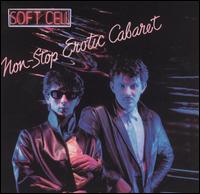 groundbreaking synthpop/New Wave duo Soft Cell, released in 1981 by Some Bizarre Records. The album's critical and commercial success was bolstered by the worldwide success of its single Tainted Love, a cover version of a little-known R&B song by Gloria Jones which topped charts worldwide and became the best-selling British single of 1981 in the United States. The album continued to produce a string of Top-5 singles in the UK, including "Bedsitter," "Torch," and the unapolagetically sentimental "Say Hello, Wave Goodbye."
groundbreaking synthpop/New Wave duo Soft Cell, released in 1981 by Some Bizarre Records. The album's critical and commercial success was bolstered by the worldwide success of its single Tainted Love, a cover version of a little-known R&B song by Gloria Jones which topped charts worldwide and became the best-selling British single of 1981 in the United States. The album continued to produce a string of Top-5 singles in the UK, including "Bedsitter," "Torch," and the unapolagetically sentimental "Say Hello, Wave Goodbye." Despite many the reputation of many New Wave bands as being on the cutting edge of technology, the album was created on a very low budget; it was supposedly recorded almost entirely with a Revox tape recorder, a borrowed Roland drum machine belonging to Kit Hain, a small, preset Roland bass synthesizer, and an NED Synclavier, the first commercially available digital synthesizer, belonging to producer Mike Thorne. The album was recorded in New York City at the height of its gay club scene, at a time which the drug MDMA (also called ecstasy) was just beginning to become popular. The sound and club beats of the album reflect this atmosphere, with songs about pornographic cinemas and infidelitrous relationships. The group caused some controversy in the UK over the single "Sex Dwarf," the video of which was banned for explicit, S&M-related content. The duo would delve deeper into its fascination with decadence on its subsequent works, including the 1982 remix album Non-stop Ecstatic Dancing, which features an alternate cut of "Sex Dwarf" on which singer Marc Almond, famous for his flamboyant, unabashed homosexuality, appears to simulate a female orgasm with his voice. This may be why they were never able to recapture the success of their premiere with their later works.
Soft Cell were and are, in some ways, more famous for their singles than for their full-length albums. Many of their most acclaimed songs (including "Torch" and "Where Did Our Love Go?") do not appear on their LP releases. An example of this is "Tainted Love," which, when originally recorded, was over eight minutes long due to the fact that it gradually segued into "Where Did Our Love Go?" After it was recorded, the session was split into two different songs, with "Where Did Our Love Go?" only being listenable as the B-side to "Tainted Love" or on the full eight-minute cut, which was sold as a 12-inch single. As a result, many of their singles have become quite valuable. Their first release, the single "Memorabilia" b/w "A Man Could Get Lost" may fetch prices as high as $85 (approximately £50), due to the fact that the original version was for many years unavailable on CD (although a remix appears on their 1982 release "Non-stop Ecstatic Dancing").
The song "Frustration" also appears on the rare 1979 independently released EP, Mutant Moments, although the two versions are very different and contain slightly different lyrics. Remixes of several tracks, including "Sex Dwarf" and an instrumental cut of "Chips On My Shoulder" also appear on the remix album, Non-stop Ecstatic Dancing.






0 COMMENTS:
Post a Comment